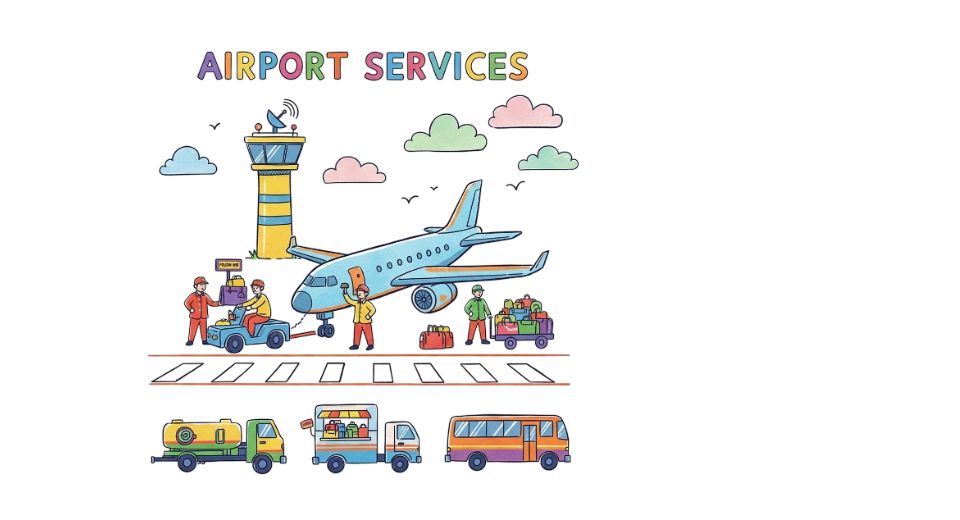
Sep 30, 2025

The global airport services market as presented by Metastat Insight is the dynamic coming together of air travel demand, passenger aspirations, and operational efficiency. Every journey through an airport involves much more than mere airplanes landing and taking off; there is ground handling, security, baggage handling, catering, and many services that define the passenger experience. These are all too easily neglected by travelers but have become increasingly important as airports evolve into centers of efficiency, security, and customer satisfaction. Increased connectivity and changes in travelers behaviour continue to underscore why this market is more important than ever.
Airports are today facing increasing pressure to maintain smooth processes while managing increasing levels of traffic, higher security standards, and sustainability demands. Delays, inefficiency in operations, and customer unhappiness reflect some of the consequences that arise when systems do not measure up. Set against this, end-to-end airport service is a bedrock on which successful operations are reliant so that flights continue on schedule, bags arrive at their destinations, and passengers are assisted along the way. Being an economy and culture promoter, aviation has the function to be serviced by airport capacity in a bid to provide seamless services. Airport services bear the globalized impact on the face of the world's travels.
Airport services are the complex array of support activities behind the scenes of the visible world of aviation. From fueling and marshaling planes to baggage handling and lounge administration, these operations work in harmony with one another to protect efficiency and customer satisfaction.
Their worth is in accuracy, punctuality, and flexibility. For airlines, sound service associations equate to shorter turnaround times, enhanced safety, and streamlined cost structures. For passengers, the same services impact convenience, comfort, and faith in air transportation. Distinct strengths like cutting-edge technology integration, baggage network automation, and enhanced catering facilities drive not just operational efficiency but also the vision for quality travel experience.
The airport service evolution is a story of incremental upgrade and strategic transformation. From being viewed as secondary processes to the heart of flight operations, these services have become progressively promoted in status as core facilitators of aviation reliability.
Technologies such as self-service check-in kiosks, electronic baggage tracking, and real-time communication platforms have optimized efficiency while minimizing friction in the passenger experience. In the long run, technological and operation models investment has made airports ecosystems ready to deal with record levels of demand. The series of events reveals how steady forward movement, supported by emerging solutions, has enabled the sector to expand beyond classical limitations and be part of world air travel.
Regional implementation of advanced airport services varies based on regional priority and infrastructure capacity. Advanced aviation hubs prioritize innovation, investing significantly in passenger convenience technology and sustainability-driven operations. On the other end are expanding regions, driven by exponential passenger growth, building resilient service platforms to maintain pace.
The two-way image captures sophistication in older markets and huge potential in those markets looking to advance their airport systems. Global collaboration and exchange of knowledge also encourage the diffusion of best practices in order for airports of any size to benefit from industry giants.
Even with progress made, significant challenges face the market for airport services. Too high an operating cost, unfriendly safety rules, and competitiveness call for perpetual re-alignment. Spending on good quality workforce training, addressing environmental issues, and keeping up with changing passenger needs are still immediate business. But there is enormous potential against it.
Growing digital capability, deployment of AI capabilities, and greener service patterns hold promise for expansion. The growing interdependence of airports, airlines, and technology providers holds the promise of further synergies, creating more intelligent, quicker, and greener services. These advances are forging a path to future development and innovation.
The airport services industry reported by Metastat Insight today closely reflects wider trends that characterize the future of business and travel. As health, digitalization, and sustainability grow, airports themselves are emerging as gateways, yes, but also symbols of development. Effective services minimize emissions by avoiding delay, maximize safety by simplifying procedures, and facilitate inclusivity by expanding access. Where mobility is needed and yet voluntary in this world, the function of these services goes beyond running the show to determine economic development, environmental sustainability, and global integration. With its position at the nexus of innovation and mobility, the airport services market is among the leading drivers in how societies move, connect, and thrive.
Drop us an email at:
Call us on:
+1 5186502376
+91 73850 57479